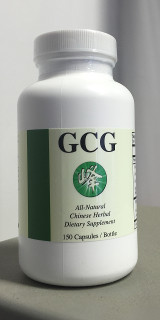
Product Details
Gold Coin Grass (GCG) capsules
(call for practitioner pricing)
 One bottle of 150 capsules. This is our classic GCG formula, but stronger and in capsule form: ideal for people who want to take GCG tincture but find its taste unpleasant, or who are not allowed to consume alcohol for religious or dietary reasons. Take between 1 and 5 pills per day.
One bottle of 150 capsules. This is our classic GCG formula, but stronger and in capsule form: ideal for people who want to take GCG tincture but find its taste unpleasant, or who are not allowed to consume alcohol for religious or dietary reasons. Take between 1 and 5 pills per day.
Ingredients: Gold Coin Grass, Bupleurum, Rhubarb, Qing Pi
Directions: take 1 to 5 capsules daily.
The primary ingredient of GCG is Gold Coin Grass, which is a literal translation of the Chinese name Jin Qian Cao. This herb is also known as Lysimachiae Herba or Herba Desmodii Styrachifolii. In traditional Chinese medicine, it is believed to "clear damp heat in the liver and gallbladder", among other uses[1][5].
The secondary ingredient of GCG is Bupleurum, also known as Chai Hu or Bupleuri Radix. The literal English translation of the name is "Twigs of the Barbarians". In traditional Chinese medicine, Chai Hu is believed to strengthen the immune system and "open the liver"[2].
The other ingredients of GCG are Rhubarb and Qing Pi. They are considered "helper" ingredients:
- Rhubarb, also known as Da Huang or Rhei Radix et Rhizoma. In traditional Chinese medicine, it is believed to "clear heat" and "invigorate the blood"[3].
- Qing Pi, also known as Green Tangerine Peel or Citri Reticulatae Viride Pericarpium. In traditional Chinese medicine, Qing Pi is believed to "spread liver chi"[4].
Possible Adverse Reactions
While rare, some allergic reactions are known to occur. If you are allergic to any of these herbs, it is possible you may experience some mild reactions such as rash, headache, or increased bowel movements and flatulence.
Notes:
- Avoid use when pregnant or lactating.
References:
- Chinese Herbal Medicine Materia Medica 3rd Edition, D Bensky & S Clavey & E Stöger, Eastland Press 2004, pp303-306.
- Ibid, pp.73-78.
- Ibid, pp.235-240.
- Ibid, pp.514-516
- Journal of Urology, Feb 1993, Effect of Desmodium styracifolium-triterpenoid on calcium oxalate renal stones, Hirayama H1, Wang Z, Nishi K, Ogawa A, Ishimatu T, Ueda S, Kubo T, Nohara T.
